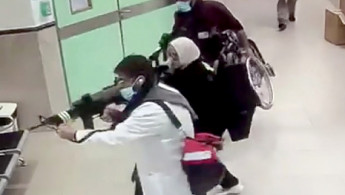Who are the Musta'ribeen, the Israeli agents disguised as Palestinians?
At 5:20 a.m. on Tuesday, about a dozen Israeli agents in disguise raided one of the biggest hospitals in Jenin in the occupied West Bank, where they assassinated three young Palestinian men who were sleeping.
The agents arrived dressed as doctors, nurses, patients, and Palestinian civilians, including a woman in a hijab and a man in a wheelchair, a video that surfaced of the raid on Jenin's Ibn Sina Hospital showed. At least one of the agents can also be seen carrying a baby bassinet.
The video showed them pulling out assault rifles as soon as they entered the hospital, where they were reportedly targeting a Hamas-linked man.
The operation reportedly took around 10 minutes, according to Israeli reports, during which three Palestinian men were killed while sleeping in their beds. The Israeli army said that only one of the assassinated men was reportedly a Hamas member.
The raid left parts of the hospital destroyed, with beds upturned and blood stains covering the floor and equipment.
The attack was carried out by an Israeli undercover unit known as the Musta'ribeen, or Mista'arvim in Hebrew.
Who are the Musta'ribeen?
The Musta'ribeen, which means those who "disguise themselves as Arabs", is an undercover unit specifically trained to infiltrate the local Palestinian population and Arab communities.
They dress, speak, and act like Palestinians, and carry out missions in the heart of towns and cities.
Their scope of operation includes but is not exclusive to gathering intelligence, undercover policing, infiltration, hostage rescue, and assassinations.
The unit predates the founding of Israel and was originally part of the Jewish Palmach, an elite division of the Haganah militia, and later the core of the Israeli forces.
The unit was founded as a result of cooperation between the Zionist movement and the British mandate authorities in Palestine during the Second World War, when the British needed intelligence agents to infiltrate the local population in the Levant and sabotage German progress.
A proposal was put through to recruit Mizrahi Jews who immigrated to Palestine from Arab countries, for the task.
Several agents were planted in neighbouring Arab countries, particularly Syria and Lebanon, forming what later became the 'Syria Platoon'.
With Germany’s defeat, the British no longer needed the platoon, eventually leading to its disbandment. This coincided with rising tensions between Zionist militias and the British, as well as local Palestinians.
The platoon was soon relaunched as an independent unit of the Israeli forces with its main objective being to penetrate Palestinian communities for espionage and sabotage purposes.
The unit, made up of officers from the Israeli forces, the border police and the internal police force, are reportedly specifically tasked with hostage rescue - although there have been no records of the Musta'ribeen used to free hostages taken by Hamas on 7 October.
The army dissolves these units once their work is found out, and forms new ones to take their place.
Inciting further violence
In Palestine, the Musta'ribeen recently became more visible mainly due to their role in infiltrating Palestinian protests.
They operate in groups of five to ten and use the chaos of the clashes between Palestinians and the Israeli army to position themselves among protesters, and even partake in burning tires and hurling rocks.
They usually wear keffiyehs and leave their shirts untucked to conceal their handguns. They would embed themselves in protests and throw rocks and incite protesters to further violence.
They usually target young Palestinians closest to the Israeli army’s front line and jump them as soon as the army starts charging forward toward the protesters.
Using stun grenades and handguns, they pin down their victims and violently arrest them. Other operatives, alongside the army, provide cover as the unit hastily retreats.
Although their role also involves gathering intelligence, more recently, Israel has mostly been collecting intelligence through high-tech surveillance, spyware, and AI.
The Israeli army's tracking technology and mass arrests of Palestinians render the Musta'ribeen activities as irrelevant - at best a marginal support role.
A hit squad
Tuesday's raid on the Jenin hospital has been interpreted as a calculated psychological operation designed to instill fear and insecurity among Palestinians.
It served as a show of force, reiterating the message that even healthcare establishments - protected under international law -remain vulnerable to incursions and attacks by Israeli forces.
It was a visible show by the Musta'ribeen to create an atmosphere of distrust, paranoia, and fear, in order to undermine any resistance movement in refugee camps in the occupied West Bank.
Many Israeli and Palestinian human rights activists view these units as little more than a hit squad.
While there are no specific statistics on how many Palestinians have been killed by the Musta'ribeen, not least due to the clandestine nature of their missions and because the Israeli army and undercover operations usually overlap.
However, Israel's largest human rights organisation, B’Tselem, estimated that between 2000 and 2010 undercover agents killed 161 Palestinians in ambushes, including 19 under the age of 16.
Musta'ribeen units have also been deployed against Palestinian citizens of Israel.
In September 2021, Adalah, the Legal Center for Arab Minority’s Rights in Israel, challenged the legality of the Israeli police setting up an undercover unit to operate in Israel’s Palestinian towns, supposedly to fight against organised crime in these localities.
"The step contradicts the Police Ordinance, which requires police officers to identify themselves," the organisation said.
Adalah stressed that "designating a special unit to a specific ethnic group is racist and illegal".
This article relied in part on research published by Emad Moussa in The New Arab





 Follow the Middle East's top stories in English at The New Arab on Google News
Follow the Middle East's top stories in English at The New Arab on Google News


